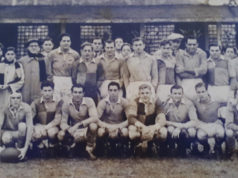Just when it seems there couldn’t be any more mines buried in the Tarrant County College downtown campus battlefield, oops, another one is tripped. The one revealed this week was buried quietly more than two years ago by former chancellor Leonardo de la Garza. Records show it was done without the approval of the TCC board of trustees even though it committed the taxpayer-supported college to millions of dollars in construction fees for work that may or may not ever be completed.
Documents released to Fort Worth Weekly show that in the spring of 2007, de la Garza, acting on his own, signed an amended contract with Austin Commercial-ConReal, the joint venture that serves as construction manager of the college’s deeply flawed downtown campus project on the Trinity River bluff near the historic Tarrant County courthouse.
Ground had been broken on the grandiose project in 2004, when costs were estimated at $135 million. By May 2007, that figure had escalated to more than $297 million, and the project was three years behind schedule, beset by a multitude of management fiascos. Among the worst: the failure by district administrators and construction managers to apply, early on, for a crucial permit from the U. S. Corps of Engineers that would allow the college to build a bridge over the Trinity River and then build part of the campus on the flood-control levees on the north side of the river. Without the permit, the whole project was at risk.
As pressure mounted to scale the project back or shut it down altogether, Austin-ConReal presented a construction change order to the chancellor that included language known in real estate and construction circles as a “lost profits clause,” which basically guarantees a contractor his original agreed-upon profits if “all or a portion of the work” is cancelled at the “convenience of the owner.” In the original contract signed at the beginning of construction, if the project were to be shut down before completion, the company’s fee would have been 4.75 percent of the value of work completed to that date.
The amended contract signed by de la Garza in 2007 guarantees the construction managers a lump sum of $11.9 million in fees even if the project is suspended or cancelled by the owner before completion, as the north half of the planned campus was in 2008. Further, it allows the construction manager to “receive termination or cancellation charges [for] materials and equipment not used in the work.”
“Something’s not right about this,” said an astounded Kyle Poulson, a partner in the Fort Worth-based global real estate firm of NAI Huff Partners, a major player in the development of the West Seventh Street corridor between downtown and the cultural district. His firm, he said, has never used such a contract. “It is very, very rare, almost unheard of, and it is never, ever done midway through a project,” a fact that raises serious questions about its legality, he said. “It would be like buying a car and then, when it breaks down, buying an extended warranty and expecting the company to honor it.”
The new contract was part of construction cost change order #3 dated May 18, 2007, and signed by de la Garza on June 6, 2007. The document included increases in the construction allowance (the amount provided for the contractor to draw against, as a portion of the overall estimated project cost) and extended the expected completion date of the project by more than two years.
Those portions of the change order were brought to the board for approval, but the change in contract language was not included, board vice-president Bobby McGee said. “We never saw it, never voted on it.”
The board minutes of May 16, 2007, when the chancellor presented the proposed change order to the board for approval, verify that all the change items were presented except the key change in contract language. In fact, trustee Kristin Vandergriff asked about the college’s liability to contractors if the Corps of Engineers did not approve the needed permits. Her question was not answered. Still, the board voted to approve the change order.
McGee doesn’t know if the amended contract is legal, and he called for a special board meeting last Monday to discuss the board’s options. However, the session was cancelled at the request of newly appointed interim chancellor Erma Johnson Hadley, who asked for more time to review the contract.
Hadley, a long-time employee of the district who is going to apply for the job when the board begins a formal search for a new chancellor, said in an e-mail that “certain language” in the change order “could be read to imply that, in the event of a termination of the contract for the convenience of TCCD, all of the general conditions and construction manager’s fee (as defined in the contract) would be owed.”
However, she said her review of the issue shows that “this was not the intention of the parties at the time of the execution” of the order in 2007. Austin-ConReal and TCCD “intend to clarify the intent of the parties and are working toward such a clarification. The language in question has never been implemented because TCCD did not terminate the contract,” she wrote.
McGee said he will push for an independent counsel to conduct a full review of the contract change and its implications. “I want to know what cost or effect the ‘lost profits’ modifications have had on the district, or may have on the district in the future. Why did the college agree to this modification? In other words, what was the quid pro quo or incentive? Who [other than the chancellor] had knowledge of … or authorized the ‘lost profits’ modifications? … This was a peculiar change that begs for an explanation,” he said.
He pointed to the timing. “It came just as the issue of the failure of the college and the construction manager to get the Corps permit was heating up,” he said, and around the same time McGee was calling for Austin-ConReal’s head on a platter.
An independent counsel should be “authorized by the board to review all business transactions and contracts between TCCD” and the construction manager, the project manager, the architects, and “their respective officers, directors, and affiliates,” he said. “We have to know what else, if anything, has been done without the board’s knowledge.”
A spokesman for Austin Commercial-ConReal said the company was declining to give interviews regarding the contract due to the “politics” surrounding the TCC project.
De la Garza could not be reached for comment.











